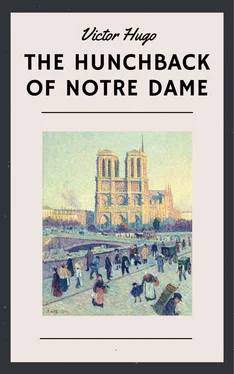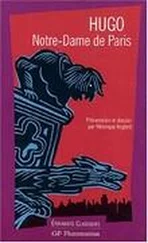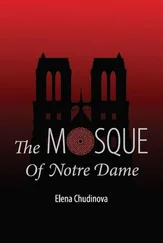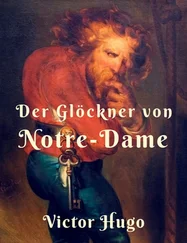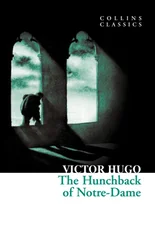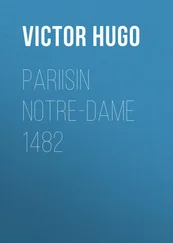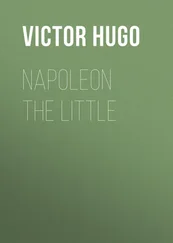Coppenole, from his post, ordered all, directed all, arranged all. During the uproar, the cardinal, no less abashed than Gringoire, had retired with all his suite, under the pretext of business and vespers, without the crowd which his arrival had so deeply stirred being in the least moved by his departure. Guillaume Rym was the only one who noticed his eminence’s discomfiture. The attention of the populace, like the sun, pursued its revolution; having set out from one end of the hall, and halted for a space in the middle, it had now reached the other end. The marble table, the brocaded gallery had each had their day; it was now the turn of the chapel of Louis XI. Henceforth, the field was open to all folly. There was no one there now, but the Flemings and the rabble.
The grimaces began. The first face which appeared at the aperture, with eyelids turned up to the reds, a mouth open like a maw, and a brow wrinkled like our hussar boots of the Empire, evoked such an inextinguishable peal of laughter that Homer would have taken all these louts for gods. Nevertheless, the grand hall was anything but Olympus, and Gringoire’s poor Jupiter knew it better than any one else. A second and third grimace followed, then another and another; and the laughter and transports of delight went on increasing. There was in this spectacle, a peculiar power of intoxication and fascination, of which it would be difficult to convey to the reader of our day and our salons any idea.
Let the reader picture to himself a series of visages presenting successively all geometrical forms, from the triangle to the trapezium, from the cone to the polyhedron; all human expressions, from wrath to lewdness; all ages, from the wrinkles of the new-born babe to the wrinkles of the aged and dying; all religious phantasmagories, from Faun to Beelzebub; all animal profiles, from the maw to the beak, from the jowl to the muzzle. Let the reader imagine all these grotesque figures of the Pont Neuf, those nightmares petrified beneath the hand of Germain Pilon, assuming life and breath, and coming in turn to stare you in the face with burning eyes; all the masks of the Carnival of Venice passing in succession before your glass,—in a word, a human kaleidoscope.
The orgy grew more and more Flemish. Teniers could have given but a very imperfect idea of it. Let the reader picture to himself in bacchanal form, Salvator Rosa’s battle. There were no longer either scholars or ambassadors or bourgeois or men or women; there was no longer any Clopin Trouillefou, nor Gilles Lecornu, nor Marie Quatrelivres, nor Robin Poussepain. All was universal license. The grand hall was no longer anything but a vast furnace of effrontry and joviality, where every mouth was a cry, every individual a posture; everything shouted and howled. The strange visages which came, in turn, to gnash their teeth in the rose window, were like so many brands cast into the brazier; and from the whole of this effervescing crowd, there escaped, as from a furnace, a sharp, piercing, stinging noise, hissing like the wings of a gnat.
“Ho hé! curse it!”
“Just look at that face!”
“It’s not good for anything.”
“Guillemette Maugerepuis, just look at that bull’s muzzle; it only lacks the horns. It can’t be your husband.”
“Another!”
“Belly of the pope! what sort of a grimace is that?”
“Hola hé! that’s cheating. One must show only one’s face.”
“That damned Perrette Callebotte! she’s capable of that!”
“Good! Good!”
“I’m stifling!”
“There’s a fellow whose ears won’t go through!” Etc., etc.
But we must do justice to our friend Jehan. In the midst of this witches’ sabbath, he was still to be seen on the top of his pillar, like the cabin-boy on the topmast. He floundered about with incredible fury. His mouth was wide open, and from it there escaped a cry which no one heard, not that it was covered by the general clamor, great as that was but because it attained, no doubt, the limit of perceptible sharp sounds, the thousand vibrations of Sauveur, or the eight thousand of Biot.
As for Gringoire, the first moment of depression having passed, he had regained his composure. He had hardened himself against adversity.—-“Continue!” he had said for the third time, to his comedians, speaking machines; then as he was marching with great strides in front of the marble table, a fancy seized him to go and appear in his turn at the aperture of the chapel, were it only for the pleasure of making a grimace at that ungrateful populace.—“But no, that would not be worthy of us; no, vengeance! let us combat until the end,” he repeated to himself; “the power of poetry over people is great; I will bring them back. We shall see which will carry the day, grimaces or polite literature.”
Alas! he had been left the sole spectator of his piece. It was far worse than it had been a little while before. He no longer beheld anything but backs.
I am mistaken. The big, patient man, whom he had already consulted in a critical moment, had remained with his face turned towards the stage. As for Gisquette and Liénarde, they had deserted him long ago.
Gringoire was touched to the heart by the fidelity of his only spectator. He approached him and addressed him, shaking his arm slightly; for the good man was leaning on the balustrade and dozing a little.
“Monsieur,” said Gringoire, “I thank you!”
“Monsieur,” replied the big man with a yawn, “for what?”
“I see what wearies you,” resumed the poet; “‘tis all this noise which prevents your hearing comfortably. But be at ease! your name shall descend to posterity! Your name, if you please?”
“Renauld Chateau, guardian of the seals of the Châtelet of Paris, at your service.”
“Monsieur, you are the only representative of the muses here,” said Gringoire.
“You are too kind, sir,” said the guardian of the seals at the Châtelet.
“You are the only one,” resumed Gringoire, “who has listened to the piece decorously. What do you think of it?”
“He! he!” replied the fat magistrate, half aroused, “it’s tolerably jolly, that’s a fact.”
Gringoire was forced to content himself with this eulogy; for a thunder of applause, mingled with a prodigious acclamation, cut their conversation short. The Pope of the Fools had been elected.
“Noel! Noel! Noel!”* shouted the people on all sides. That was, in fact, a marvellous grimace which was beaming at that moment through the aperture in the rose window. After all the pentagonal, hexagonal, and whimsical faces, which had succeeded each other at that hole without realizing the ideal of the grotesque which their imaginations, excited by the orgy, had constructed, nothing less was needed to win their suffrages than the sublime grimace which had just dazzled the assembly. Master Coppenole himself applauded, and Clopin Trouillefou, who had been among the competitors (and God knows what intensity of ugliness his visage could attain), confessed himself conquered: We will do the same. We shall not try to give the reader an idea of that tetrahedral nose, that horseshoe mouth; that little left eye obstructed with a red, bushy, bristling eyebrow, while the right eye disappeared entirely beneath an enormous wart; of those teeth in disarray, broken here and there, like the embattled parapet of a fortress; of that callous lip, upon which one of these teeth encroached, like the tusk of an elephant; of that forked chin; and above all, of the expression spread over the whole; of that mixture of malice, amazement, and sadness. Let the reader dream of this whole, if he can.
* The ancient French hurrah.
The acclamation was unanimous; people rushed towards the chapel. They made the lucky Pope of the Fools come forth in triumph. But it was then that surprise and admiration attained their highest pitch; the grimace was his face.
Читать дальше
